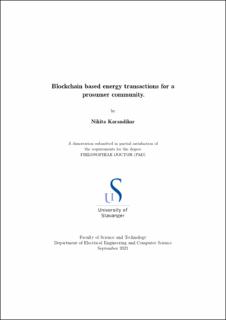| dc.contributor.advisor | Chakravorty, Antorweep | |
| dc.contributor.advisor | Rong, Chunming | |
| dc.contributor.author | Karandikar, Nikita | |
| dc.date.accessioned | 2021-09-14T11:41:58Z | |
| dc.date.available | 2021-09-14T11:41:58Z | |
| dc.date.issued | 2021-09 | |
| dc.identifier.citation | Blockchain based energy transactions for a prosumer community by Nikita Karandikar, Stavanger : University of Stavanger, 2021 (PhD thesis UiS, no. 599) | en_US |
| dc.identifier.isbn | 978-82-8439-018-5 | |
| dc.identifier.issn | 1890-1387 | |
| dc.identifier.uri | https://hdl.handle.net/11250/2776481 | |
| dc.description | PhD thesis in Information technology | en_US |
| dc.description.abstract | Integration of solar micro-generation capabilities in domestic contexts is on the rise, leading to the creation of prosumer communities who generate part of the energy they consume. Prosumer communities require a decentralized, transparent and immutable transaction system in order to extract value from their surplus energy generation and usage flexibility. The aim of this study is to develop frameworks and methods to create such a prosumer transaction system with self enforcing smart contracts to facilitate trading of energy assets such as electricity units, energy flexibility incentives and storage credits.
Blockchain is a transparent, distributed ledger for consensus based transaction processing maintained by a network of peer nodes. Hyperledger Fabric is a blockchain platform that offers the added benefits of lower operating cost, faster transaction processing, user authentication based access control and support for self enforcing smart contracts.
This thesis investigates the applicability of Hyperledger Fabric to tokenize and transact energy assets in a unified transaction system. Data driven approaches to implement an incentive based energy flexibility system for peak mitigation on the blockchain are also investigated.
To this end, the stakeholders for such a transaction management system were identified and their business relationships and interactions were described. Energy assets were encapsulated into blockchain tokens and algorithms were developed and encoded into self enforcing smart contracts based on the stakeholder relationships. A unified transaction framework was proposed that would bring on board all the stakeholders, their trading relationships and the assets being transacted. Tokens and methods in the transaction system were implemented in fungible and non fungible versions and the versions were critically compared in terms of application area, design, algorithmic complexity, performance, advantages and disadvantages. Further, with a focus on energy flexibility applications, a prosumer research dataset was analysed to gain insights into the production and consumption behaviors. Based on these insights, a data driven approach for peak mitigation was proposed and implemented on the Hyperledger Fabric blockchain.
The thesis thus addresses different aspects of a blockchain based prosumer transaction system, and shows the feasibility of proposed approaches through implementation and performance testing of proofs of concept. | en_US |
| dc.language.iso | eng | en_US |
| dc.publisher | University of Stavanger, Norway | en_US |
| dc.relation.ispartofseries | PhD thesis UiS; | |
| dc.relation.ispartofseries | ;599 | |
| dc.relation.haspart | Paper 1: Karandikar, N., Chakravorty, A., Rong, C. (2019) Transactive energy on Hyperledger Fabric. Proceedings of 2019 Sixth International Conference on Internet of Things: Systems, Management and Security (IOTSMS). DOI: 10.1109/IOTSMS48152.2019.8939271.
In reference to IEEE copyrighted material which is used with permission in this thesis, the IEEE does not endorse any of University of Stavanger's products or services. Internal or personal use of this material is permitted. If interested in
reprinting/republishing IEEE copyrighted material for advertising or promotional purposes or for creating new collective works for resale or redistribution, please go to http://www.ieee.org/publications_standards/publications/rights/rights_link.html
to learn how to obtain a License from RightsLink. | en_US |
| dc.relation.haspart | Paper 2: Karandikar, N., Chakravorty, A., Rong, C. (2020) RenewLedger : Renewable energy management powered by Hyperledger Fabric. Published in the proceedings of 2020 IEEE Symposium on Computers and Communications (ISCC), DOI: 10.1109/ISCC50000.2020.9219651.
In reference to IEEE copyrighted material which is used with permission in this thesis, the IEEE does not endorse any of University of Stavanger's products or services. Internal or personal use of this material is permitted. If interested in
reprinting/republishing IEEE copyrighted material for advertising or promotional purposes or for creating new collective works for resale or redistribution, please go to http://www.ieee.org/publications_standards/publications/rights/rights_link.html
to learn how to obtain a License from RightsLink. | en_US |
| dc.relation.haspart | Paper 3: Karandikar, N., Abhishek, R., Saurabh, N. et al. (2021) Blockchain-based prosumer incentivization for peak mitigation through temporal aggregation and contextual clustering. Blockchain: Research and Applications, DOI:10.1016/j.bcra.2021.100016 | en_US |
| dc.relation.haspart | Paper 4: Karandikar, N., Chakravorty, A., Rong, C. (2021) Blockchain Based Transaction System with Fungible and Non-Fungible Tokens for a Community-Based Energy Infrastructure. Sensors, 21(11), 3822; DOI; 10.3390/s21113822 | en_US |
| dc.rights | Copyright the author | |
| dc.subject | informasjonsteknologi | en_US |
| dc.subject | blockchain | en_US |
| dc.title | Blockchain based energy transactions for a prosumer community | en_US |
| dc.type | Doctoral thesis | en_US |
| dc.rights.holder | © Nikita Karandikar, 2021 | en_US |
| dc.subject.nsi | VDP::Mathematics and natural science: 400::Information and communication science: 420 | en_US |
